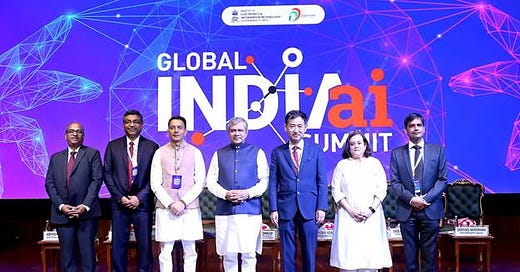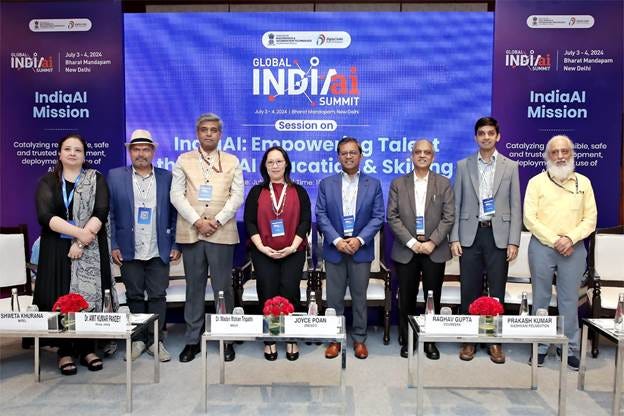Global INDIAai Summit 2024: A Resounding Success
We also underscore what we wanted to see more of.
Unprecedented Global Participation
The Global INDIAai Summit, held at Bharat Mandapam in New Delhi on July 3-4, 2024, marked a resounding success. This significant event attracted over 12,000 participants, with 2,000 global AI experts, policymakers, practitioners, and academics attending in person, and an additional 10,000 joining virtually. With delegates from 50 countries, the summit showcased its international appeal and emphasized the global importance of the discussions held. This event was a major initiative under the leadership of India’s IT Minister, Ashwani Vaishnaw, a bureaucrat-turned-technocrat-turned-politician, in his second ministerial term under the Modi government. Organized just a month after his swearing-in, the summit highlighted the priority that India places on AI and its advancements, underscoring the strategic importance of AI technologies in the country's future development plans.
Setting the Agenda for AI Democratization
One of the central themes of the summit was the democratization of AI, spearheaded by the Government of India's commitment to make AI accessible to all. The discussions focused on overcoming the challenges of implementing AI solutions, comparing Western models, and tailoring India's unique approach to meet its domestic needs while aspiring for global leadership in AI innovation.
Bridging Global Divides
The summit served as a pivotal platform for bridging the gap between the Global North and the Global South, with India playing a crucial role in giving a voice to the latter in global AI forums. This was particularly evident in the sessions dedicated to discussing the roles and contributions of various countries from the Global South.
Forging New Partnerships
A significant announcement made at the summit was the new integrated partnership on AI between the OECD - OCDE and GPAI. This partnership aims to enhance global cooperation and reduce the AI divide by fostering collaboration among member countries and AI experts worldwide.
INDIAai Mission and AI Ecosystem Development
The INDIAai Mission, approved with a substantial budget of USD 1.25 billion, was a focal point of discussion. Experts debated strategies to build a robust, inclusive AI ecosystem in India that could lead global AI innovation. The sessions outlined plans for multi-LLM models, platformization, standardization of AI-ready data, and a multi-stakeholder approach critical for the mission's success.
Empowering the Startup Ecosystem
The summit also spotlighted the dynamic Indian startup scene with 16 deep-tech startups showcasing their AI applications. Discussions emphasized the government’s support, including a designated fund of approximately USD 256 million to nurture the startup ecosystem, highlighting India’s commitment to fostering innovation and supporting indigenous AI solutions.
Education and Skilling for an AI-ready Future
Education and workforce skilling were prominent themes, with discussions on creating AI-ready talent pools in India. Esteemed panelists, including leaders from UNESCO and major tech firms, discussed the need for effective training, mutual recognition of certifications, and development of AI learning environments that cater to diverse needs and age groups.
Constructive Criticism: Room for Improvement
a.) Absence of Global Tech Leaders
The summit notably lacked the presence of top-tier executives from global tech giants such as OpenAI, Google, xAI, and Microsoft. Instead, the representatives were primarily India-country heads. This level of representation, while significant, did not quite match the global stature of AI discourse that could have been achieved with higher-ranking officials participating.
b.) Lack of Highest-Level Political Engagement
The absence of the Prime Minister's personal engagement was noticeable, considering the international and strategic importance of the summit. High-level political presence could have underscored the government's commitment to AI development and helped elevate the discussions on international platforms.
c.) Inadequate Focus on Critical AI Issues
The discussions at the summit touched only lightly on crucial topics such as Sovereign AI and the implications of implementing AI technologies in the context of India's new data privacy laws. Privacy considerations, especially relevant given global concerns, required more rigorous exploration to address public and policy-level concerns effectively.
d.) Addressing the Challenges of AI Misuse
There was a notable lack of emphasis on addressing the challenges posed by deep-fakes and shallow-fakes in spreading hate speech, a critical issue as these technologies become more sophisticated and their potential for misuse grows. This topic is crucial for maintaining societal trust and security in the era of advanced AI technologies.
e.) Impact on Employment and Education
The potential displacement of jobs due to advancements in AI, including in sectors like coding and AR/VR editing, was insufficiently addressed. This oversight is significant given the impact on a large sector of the workforce. Additionally, the integration of AI education into school and college curricula for students not pursuing science and technology needs more attention to adequately prepare the next generation for an AI-driven world.
Despite these areas for improvement, the summit was a commendable first international attempt, laying a solid foundation for India to build upon and lead in the global AI conversation. Future events should aim for more comprehensive and inclusive discussions to address these critical issues.
Summing Up and Future Prospects
The Global INDIAai Summit effectively set the stage for future global AI collaborations and highlighted India's pivotal role as an emerging leader in AI innovation and policy development. Despite some notable absences and areas for improvement, the event showcased India's commitment to creating a comprehensive AI development strategy that aims to be inclusive and beneficial globally. Moving forward, it is imperative that future summits address the gaps identified, such as engaging more high-profile global tech leaders and political figures, and deepening discussions on critical issues like privacy, AI misuse, and the socioeconomic impacts of AI technology. By doing so, India can strengthen its position in the global AI landscape and ensure that its contributions are both impactful and aligned with global standards and needs.
If you believe this article would interest someone you know, please feel free to share it anonymously (for us), using any platform that you prefer.







